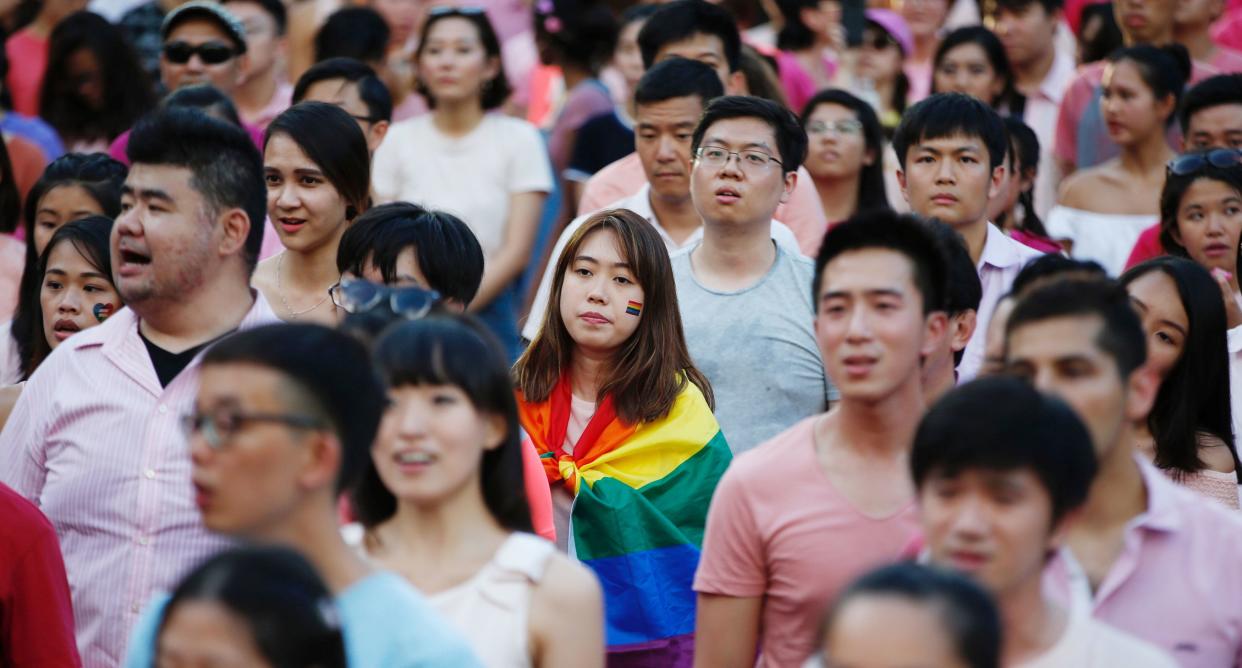Most Singapore residents favour retaining 377A without enforcement: survey

This is the final of four stories based on the responses by Singapore residents to questions in a Blackbox Research survey related to Section 377A of the Penal Code.
Most Singapore residents favour retaining Section 377A of the Penal Code even if it is not enforced, a survey conducted by market research consultancy Blackbox Research shows.
Section 377A criminalises sex between men but authorities in Singapore have said it is rarely enforced.
One of the questions posed by the recent survey commissioned by Yahoo News Singapore was: “Singapore should keep Section 377A even if it is not enforced. Do you agree?”
Of the 1,000 respondents, 42 per cent strongly agreed or agreed with the statement, with 19 per cent strongly disagreeing or disagreeing. The remaining 40 per cent expressed a neutral stance on the issue.
The results were largely consistent across male and female respondents.
The proportions of male and female respondents who strongly agreed or agreed with the statement were 41 per cent and 42 per cent, respectively.
The proportions of males and females who strongly disagreed or disagreed with the statement were 21 and 17 per cent, respectively, while the remaining 38 per cent of males and 41 per cent of females were neutral on the issue.

By age group, fewer respondents aged 15-24 years old strongly agreed or agreed with the statement, compared with those from the older age groups. Only 28 per cent from the age group strongly agreed or agreed with the statement, compared with 41 per cent (25-34 years old), 38 per cent (35-49 years old) and 48 per cent (50 years old and above).
Among those who strongly disagreed or disagreed with the statement, the proportions were 27 per cent (15-24 years old), 22 per cent (25-34 years old), 19 per cent (35-49 years old) and 15 per cent (50 years old and above).
The proportions who were neutral were 45 per cent (15-24 years old), 38 per cent (25-34 years old), 43 per cent (35-49 years old) and 37 per cent (50 years old and above).
The debate over Section 377A was reignited after the Indian Supreme Court’s decision in September to strike down a similar law, and top Singapore diplomat Tommy Koh urged a renewed constitutional challenge to the gay sex ban.
Petitions have since been started by activists on both sides of the divide, with religious groups weighing in, and a deejay filing a fresh legal challenge.
While Prime Minister Lee Hsien Loong had said in 2004 that authorities would not actively enforce 377A, Attorney-General Lucien Wong said in October that the Public Prosecutor (PP) had “the discretion to institute, conduct or discontinue any proceedings for any offence is vested in the Attorney-General as the PP”.
Wong was responding to comments from two of his predecessors, who had said that retaining the law while not enforcing it poses a constitutional problem.
Minister for Law and Home Affairs K. Shanmugam also said that any decision on 377A is a matter for Parliament. Depending on the legislation, public opinion is “often relevant” during policy making in Parliament, he added.
The respondents in the Blackbox poll, which was conducted from 12-19 October this year, are Singaporeans and Singapore residents.
Read more about the Blackbox survey:
Singapore residents split on whether 377A repeal would lead to breakdown of family unit:survey
Most Singapore residents agree religious views shouldn’t influence the law: survey
Related stories:
Repeal 377A organisers urge supporters to reach out to their MPs
K Shanmugam answers queries on Section 377A by church leaders at briefing



